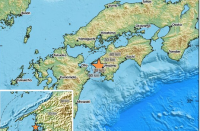JERUSALEM (AFP) — by Clothilde Mraffko and Alexandra Vardi
Israel has deported a Filipina migrant worker and her Israeli-born teenage son who has never set foot in the Philippines, after 11th hour legal appeals failed, a rights group and authorities said Tuesday.
She is among some 600 workers from the Southeast Asian nation who activists say could face deportation over a loss of residency status.
They include those who breached the conditions of their residency by starting families in the country.
The families and supporters say deporting the children to a country which they have never seen and whose languages they do not speak is a cruel policy.
Rosemarie Perez was arrested by immigration officials along with her 13-year-old son Rohan last week for remaining in the country illegally.
They had been taken to Ben-Gurion airport near Tel Aviv on Sunday night after an appeals court upheld their deportation, Beth Franco of the United Children of Israel (UCI) association said.
But they were taken off the plane after their lawyer requested an urgent hearing on their status in a bid to have them remain in Israel.
On Monday evening, they were escorted to Ben-Gurion airport where they were put on a flight to Bangkok for onward connection to Manila, Franco said.
Israel’s immigration authority confirmed in a statement they had been deported, adding Perez had been in the country illegally for 12 years and that all court appeals had been exhausted.
Franco, also originally from the Philippines, said other mothers now feared they and their children could soon be deported over the same policy.
– Protests held –
Last week, migrants, their children and Israeli supporters staged a protest in Tel Aviv against the policy of deporting Israeli-born children of migrants.
Many of the 29,000 — largely Christian — Filipinos in Israel arrived to work as caregivers and home help, but according to UCI, some 600 families could now face expulsion.
Their visas were conditioned on the requirement that they do not start a family in the country apart from certain exceptions, the association says.
The issue has particular resonance in Israel, where there are long-term fears about maintaining a Jewish majority in the country which was founded as a national homeland for Jews in the wake of the Holocaust.
Perez had arrived in Israel in 2002 to work as a caregiver for an elderly woman before losing her status over having started a family there, UCI said.
They lived near the Tel Aviv central bus station and formed relationships with other foreign workers, according to the association.
Just before the teenager was deported, “Rohan borrowed a phone and talked to my son,” said Evangeline Nacional, also from the Philippines and whose son Kevin was best friends with him.
The two boys cried over the phone, she said, adding they had regularly played video games and basketball together.
They spoke in English and Hebrew, she said, adding that they can understand but do not speak Tagalog, their mothers’ native language.
They were able to speak by phone again on Tuesday, she said.
Of the 29,000 Filipinos in Israel, some 25,000 have a temporary visa, according to the Philippines consul general.
© Agence France-Presse







